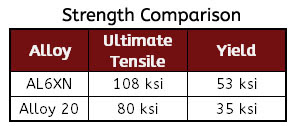
These two alloys—AL6XN and Alloy 20—are frequently mistaken for being nearly identical, but that's not entirely accurate. While both are nickel-based alloys and share several key attributes, there are notable differences between them. For instance, both alloys maintain their strength up to around 1000°F and exhibit excellent performance in saltwater environments, resisting crevice corrosion, pitting, and stress corrosion cracking. However, beyond these similarities, their distinct characteristics set them apart.
 Chemical Composition
Chemical Composition
To begin with, let’s look at their chemical makeup. Both alloys consist primarily of nickel, chromium, molybdenum, and iron, along with trace elements. The main difference lies in their respective compositions: AL6XN contains a higher proportion of molybdenum and iron, making it stronger than Alloy 20. Conversely, Alloy 20 boasts a higher nickel content, enhancing its corrosion resistance.

Â
Â
Â
Acid Corrosion Resistance
Alloy 20 was engineered specifically to handle aggressive sulfuric acid environments, particularly at high temperatures. It excels in resisting stress-corrosion cracking in boiling sulfuric acid within the 20–40% concentration range and offers robust overall sulfuric acid resistance. However, when it comes to formic acid, AL6XN proves superior due to its unique properties.
Strength
Because AL6XN contains more iron and molybdenum, it boasts a yield strength approximately 50% greater than that of Alloy 20.
Â
 Which Is Better?
Which Is Better?
Simply put, it depends on your application. Alloy 20 leads in general acid protection, while AL6XN shines in strength and certain specialized applications. Both alloys work equally well in saltwater environments and perform reliably up to 1000°F.
Corrosion Resistance: Alloy 20
Strength: AL6XN
Saltwater Performance: Equal
Temperature Resistance: Equal
When choosing between these two alloys, consider the specific demands of your project. If you need enhanced corrosion resistance, Alloy 20 might be the better option. But if you require greater strength or are working with formic acid, AL6XN could be the superior choice.
Segmented Dies,Screw Punch Die,Tungsten Carbide Segmented Die,Carbide Segmented Hexagon Die
Hebei Yuanyue Trading Co.,Ltd , https://www.hbyuanyue.com
